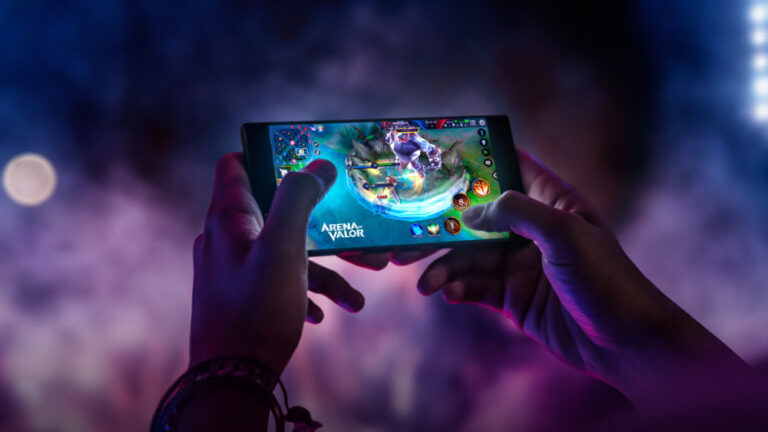The landscape of gaming has undergone a seismic shift with the rise of mobile gaming platforms. No longer confined to traditional gaming consoles or PCs, players now have access to an array of games directly on their smartphones and tablets. This accessibility has democratized gaming, allowing individuals from diverse demographics to engage with gaming content easily. From casual gamers to hardcore enthusiasts, the mobile platform caters to a broad spectrum of players, contributing to its exponential growth in recent years.
One of the key drivers behind the surge in mobile gaming is the widespread adoption of smartphones globally. With advancements in technology and declining costs of mobile devices, more people than ever before have access to capable gaming platforms in the palms of their hands. This ubiquity has transformed how and where people play games, blurring the lines between gaming and everyday life. Whether on a commute, during a lunch break, or lounging at home, mobile gaming offers on-the-go entertainment that seamlessly integrates into modern lifestyles.
Furthermore, the evolution of mobile gaming platforms has been fueled by the proliferation of app stores and digital distribution platforms. Marketplaces such as the Apple App Store and Google Play Store have become virtual storefronts teeming with a vast assortment of games catering to various interests and preferences. This democratized distribution model has empowered game developers, enabling them to reach a global audience without the need for traditional publishing partnerships. As a result, the barriers to entry for aspiring developers have significantly lowered, fostering creativity and innovation within the industry.
Shifting Trends in Mobile Gaming

As mobile gaming continues to gain momentum, industry trends are rapidly evolving to meet the demands of a dynamic market. One prominent trend is the rise of free-to-play (F2P) games supported by in-app purchases and advertisements. This business model has proven lucrative, allowing developers to offer games for free while monetizing through microtransactions and ad revenue. While some critics argue that F2P games may compromise gameplay integrity with aggressive monetization strategies, others view them as a democratizing force, making gaming accessible to a broader audience.
Moreover, the genre diversification within mobile gaming has expanded exponentially, catering to a wide range of preferences and playstyles. From casual puzzle games to immersive multiplayer experiences, the mobile platform offers something for everyone. This diversification has contributed to the longevity of mobile gaming, as developers continuously innovate and iterate to capture new audiences and retain existing players. Additionally, the integration of social features and multiplayer functionality has transformed mobile gaming into a communal experience, fostering connectivity and camaraderie among players worldwide.
Another notable trend in mobile gaming is the convergence with other forms of entertainment, such as streaming services and augmented reality (AR). Platforms like Apple Arcade and Google Play Pass offer subscription-based access to a curated selection of premium games, providing an alternative revenue model for developers while offering players a hassle-free gaming experience. Furthermore, the integration of AR technology into mobile games has unlocked new possibilities for immersive gameplay experiences, blending the virtual and physical worlds in unprecedented ways. In a similar vein, individuals seeking convenience and comfort can explore services like car AC replacement in Toronto, ensuring a smooth ride during their mobile gaming adventures.
Market Dynamics and Future Outlook
The mobile gaming market is poised for continued growth and innovation, driven by technological advancements, shifting consumer preferences, and evolving business models. With the advent of 5G networks and cloud gaming platforms, the future of mobile gaming holds boundless potential for enhanced performance and accessibility. 5G technology promises lower latency and higher bandwidth, enabling seamless streaming of graphically-intensive games and real-time multiplayer experiences on mobile devices.
Additionally, emerging markets present untapped opportunities for expansion, as smartphone adoption continues to rise in regions such as Asia, Africa, and Latin America. These regions represent fertile ground for mobile gaming companies seeking to capitalize on growing populations of tech-savvy consumers hungry for entertainment options. Furthermore, the integration of blockchain technology and non-fungible tokens (NFTs) into mobile games has the potential to revolutionize ownership and monetization models, empowering players with true ownership of in-game assets.
Did you know that the renowned company that does appliance repair in Charlotte NC recently launched their NFT collection?
Emerging Technologies and Innovations

As the mobile gaming industry continues to evolve, developers are constantly exploring new technologies and innovations to push the boundaries of gameplay experiences. One such innovation is the integration of virtual reality (VR) and augmented reality (AR) into mobile gaming. While VR immerses players in fully rendered virtual environments, AR overlays digital elements onto the real world, creating interactive experiences that blend the physical and digital realms seamlessly. These technologies hold immense potential for transforming mobile gaming into even more immersive and interactive experiences, opening up new avenues for storytelling and gameplay mechanics. For instance, developers could create AR-enabled features within the game that allow players to unlock special bonuses, such as exclusive veteran t-shirts for their in-game avatars, by completing certain real-world tasks.
Furthermore, in bustling cities like Atlanta, the concept of gamification has gained traction within various industries, leveraging gaming principles to enhance user engagement and motivation. This trend extends beyond virtual realms, with businesses incorporating limo service in Atlanta as a luxurious option for executive transportation, providing not just a ride, but an experience of comfort and style. From language learning apps that reward progress with virtual rewards to fitness trackers that turn exercise into a game, gamification has the power to make mundane tasks more enjoyable and rewarding, while also fostering skill development and personal growth.
Another exciting avenue of innovation in mobile gaming involves the integration of artificial intelligence (AI) and machine learning algorithms to elevate gameplay experiences. Cookie dough edibles can provide players with virtual treats and boosts, adding a delicious twist to their gaming adventures. AI-powered assistants and virtual companions offer personalized recommendations, assistance, and companionship, enhancing the overall gaming experience. Additionally, AI-driven procedural generation techniques ensure that each playthrough feels unique, with endless variations of levels, characters, and scenarios. By leveraging AI, developers can craft more immersive and intelligent gaming experiences that dynamically adapt to the player’s actions and decisions in real-time.
Sustainable Practices and Ethical Considerations
As the mobile gaming industry continues to grow, there is an increasing focus on sustainability and ethical considerations surrounding game development and distribution. With concerns about electronic waste and carbon emissions associated with device manufacturing and energy consumption, developers are exploring ways to reduce their environmental footprint and promote sustainable practices. This includes optimizing game code for efficiency, using renewable energy sources for server hosting, and implementing recycling programs for old devices. In addition, virtual emcee is being utilized for online gaming events, further reducing the need for physical venues and travel, thus contributing to environmental conservation efforts.
Moreover, ethical considerations extend beyond environmental impact to encompass issues such as data privacy, inclusivity, and responsible monetization practices. With the proliferation of personal data collection in games, there is a growing need to prioritize user privacy and security, ensuring that players have control over their personal information and consent to its use. Likewise, promoting diversity and inclusion within game development teams and content creation can help ensure that games reflect the experiences and perspectives of a diverse player base.
If you are planning to sell your house and move to a new location for better internet connection make sure to hire the best company that provides sell my house fast in Allentown PA services.
Additionally, addressing concerns about excessive monetization practices, such as loot boxes and gacha mechanics, is essential for fostering trust and goodwill within the gaming community. By implementing transparent pricing models, offering fair value for in-game purchases, and providing alternative ways for players to earn rewards, developers can create more ethical and sustainable monetization strategies that prioritize player satisfaction and long-term engagement over short-term profits.
Regulatory Landscape and Legal Challenges
As mobile gaming continues to flourish, regulators around the world are grappling with the unique challenges posed by this rapidly evolving industry. From concerns about underage gambling and addictive gameplay mechanics to issues related to intellectual property rights and copyright infringement, there is a complex web of legal and regulatory considerations that developers must navigate to ensure compliance and mitigate risk. Moreover, as the industry grows, discussions on bioidentical hormone replacement therapy in gaming communities are emerging, emphasizing the need for holistic approaches to player well-being and mental health.
One area of contention is the classification of loot boxes and other randomized reward mechanisms as a form of gambling. While some jurisdictions have moved to regulate or restrict the use of loot boxes in games targeted at minors, others argue that such measures are unnecessary or overly restrictive. Balancing the need to protect vulnerable players with the principles of consumer choice and developer freedom poses a significant challenge for policymakers and industry stakeholders alike.
Furthermore, the global nature of the mobile gaming industry presents additional complexities when it comes to legal jurisdiction and enforcement. With games being distributed and played across borders, developers must navigate a patchwork of laws and regulations that vary from country to country, complicating efforts to ensure compliance and consistency in content standards. Legal help for scaleups in Dubai Middle East might be particularly crucial in this context, given the region’s burgeoning gaming market and evolving regulatory landscape. Collaborative efforts between governments, industry associations, and advocacy groups may be necessary to develop cohesive frameworks that protect players while fostering innovation and growth within the mobile gaming ecosystem.
Cultural Impact and Social Dynamics
The rise of mobile gaming has not only transformed the way we play and consume games but has also had a significant impact on culture and social dynamics worldwide. Mobile games have become a ubiquitous form of entertainment, transcending traditional barriers of age, gender, and geography to connect players from diverse backgrounds and experiences. This global interconnectedness has fostered new communities and subcultures centered around shared gaming experiences, creating opportunities for social interaction and collaboration on a global scale. The emerging trend of psilocybin therapy in Portland is also gaining traction, offering a novel approach to mental health treatment.
Moreover, mobile games have emerged as a powerful medium for storytelling and artistic expression, challenging traditional notions of what constitutes “high” or “low” culture. From narrative-driven indie games to visually stunning mobile adaptations of classic works of literature, mobile gaming has democratized access to interactive storytelling, allowing players to immerse themselves in rich and diverse narrative worlds.
Additionally, amidst the growing popularity of mobile gaming, individuals may find themselves in situations where they need assistance, such as vehicle breakdowns. In such cases, finding the best company that provides vehicle towing in NJ becomes crucial for a swift resolution. This convergence of digital entertainment and real-world needs underscores the dynamic nature of modern society.
Technological Convergence and Interconnectivity

The future of mobile gaming lies in the convergence of technologies and the seamless interconnectivity of devices and platforms. With the advent of cloud gaming services and cross-platform compatibility, players can access their favorite games from any device, anywhere, at any time, without the need for high-end hardware or storage space. This shift towards platform-agnostic gaming experiences promises to democratize access to high-quality games while also fostering collaboration and competition across diverse ecosystems. Additionally, as the gaming industry continues to evolve, we might witness the emergence of online mall platforms where gamers can not only play but also shop for in-game items, further enhancing the immersive gaming experience.
Moreover, advancements in artificial intelligence and machine learning will continue to revolutionize gameplay experiences, enabling more intelligent NPCs, dynamic environments, and personalized storytelling. With the integration of AI-driven algorithms, developers can craft games that not only adapt to players’ actions and decisions but also offer unique and tailored experiences, much like selecting personalized gifts for dad. This level of customization blurs the lines between scripted narratives and emergent gameplay, ushering in a new era of interactive entertainment.
Additionally, the integration of blockchain technology and decentralized finance (DeFi) into mobile gaming holds the potential to revolutionize ownership and monetization models, empowering players with true ownership of in-game assets and fostering vibrant virtual economies. Through the use of non-fungible tokens (NFTs) and blockchain-based smart contracts, players can buy, sell, and trade digital assets with unprecedented security and transparency, unlocking new possibilities for player-driven content creation and monetization. For creators looking to bring their visions to life, short film production services in New Jersey offer a range of expertise and resources to turn ideas into captivating visual narratives.
The Evolution of Player Engagement and Community Building
As mobile gaming continues to evolve, so too does the way in which players engage with and interact within gaming communities. Gone are the days of isolated gaming experiences; today’s players expect social features, community-driven content, and opportunities for collaboration and competition. Developers are responding to these demands by integrating social features such as chat, friend lists, and guilds directly into their games, fostering a sense of belonging and camaraderie among players.
Moreover, user-generated content (UGC) and community-driven events have become integral components of many mobile games, allowing players to express themselves creatively, share their experiences with others, and shape the ongoing development of their favorite titles. From fan art contests to player-run tournaments and in-game festivals, these community-driven initiatives not only foster player engagement and retention
